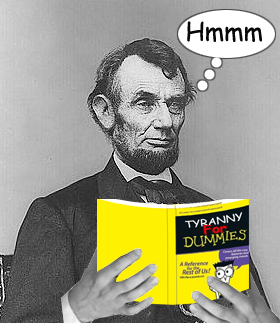
Massachusetts
Governor John Andrew pressed Lincoln for war upon the South though he
used Massachusetts men sparingly; that State’s regiments included
California men in their cavalry, and captured South Carolina slaves
enlisted into Massachusetts units who would count against the State’s
quota of troops. The latter saved Andrew from conscripting his white
constituents and certain defeat in the next election.
Bernhard Thuersam, Chairman
North Carolina War Between the States Sesquicentennial Commission
"The Official Website of the North Carolina WBTS Sesquicentennial"
Massachusetts Arms for War
“Even
as conservatives were exploring the possibilities of conciliation and
seeking means of influencing [president-elect] Lincoln, Massachusetts’
newly elected Governor, John Andrew, was kindling the fires of
radicalism. Southern society, he declared, must be entirely reorganized,
and the federal government ought to be driven to aid in the work.
There
must be no “weak-kneed” measures. “I am for unflinching firmness in
adhering to….all our principles.” “We must conquer the South,” he said,
and “to do this we must bring the Northern mind to a comprehension of
this necessity.” “War is in the air,” he later confessed, “and some of
us breathed it.”
As
Congress gave more attention to compromise measures, Andrew hurried to
Washington to consult with congressional radicals. A Virginia
congressman, John Y. Mason, swore to Andrew that never could the South
be induced to rejoin a Union of which Massachusetts was a member.
Thus
confirmed in his direst apprehensions, Andrew held conference, on
Christmas Eve, with Senators Doolittle of Wisconsin, Trumbull of
Illinois, and Sumner and Wilson of his own Massachusetts. Solemnly the
radical coterie decoded that the integrity of the Union must be
preserved, “though it cost a million lives.”
The
Governor-elect’s impassioned and sanguinary pronouncements chilled
conservative hearts in Massachusetts. Boston Brahmins were horrified and
indignant; they distrusted Andrew, whom they believed to be wanting in
good judgment, common sense and practical ability. “What was
apprehension about Andrew,” ruefully admitted Sam Bowles, “is now
conviction.” He wobbles like an old cart – is conceited, dogmatic, and
lacks breadth and tact for government.” Democrats, sickened by the
radicals’ willingness to sacrifice other men’s lives, asked whether
people wished to die for the radical cause.
[On
his inauguration day January 1, 1861, the new governor stated that]
South Carolina’s secession was an injury to the Old Bay State, which was
ready to endure once more, if need be, the sacrifices it had borne
during the Revolution. So saying, the newly-sworn Governor called on
the legislature to arm the State for war.
The
entire address, sneered the Boston Post, was a lamentable appeal to
passion, combining “the narrowness of a mere lawyer, with the
intenseness of a fanatic.” It was “sophomoric in style, immature in
thought, wretched in argument, and small in political knowledge.”
To
assist him in his work, Andrew chose four aides – carefully culled from
Harvard graduates and the better families – bestowed military titles
upon them, and put them to gathering steamboats, purchasing supplies and
inspecting the militia. The people, [Andrew] said, must become used to
the smell of gunpowder.”
Lincoln and the War Governors, William B. Hesseltine, Alfred A. Knopf, 1948, pp. 110-112)

No comments:
Post a Comment